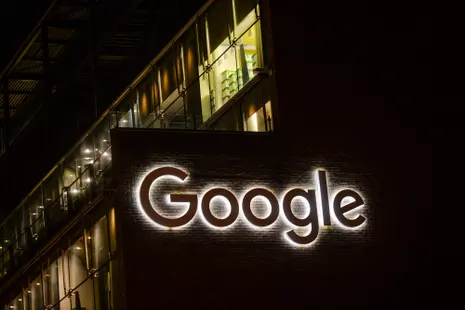EU Fines Google $3.5 Billion in Antitrust Case Over Digital Ads; Trump Slams Ruling as “Unfair”

European Union regulators on Friday levied a massive €2.95 billion ($3.5 billion) fine against Google, accusing the tech giant of systematically violating competition rules by steering business toward its own advertising services at the expense of rivals. The European Commission — the EU’s executive branch and chief antitrust enforcer — also ordered the California-based company to stop its “self-preferencing practices” and eliminate what it described as “conflicts of interest” in its advertising technology supply chain.
The ruling marks the fourth time since 2017 that Brussels has imposed a multibillion-euro penalty against Google in a series of long-running clashes between European regulators and Big Tech. Officials said the decision was based on a years-long investigation that determined Google had abused its market dominance through its AdX exchange and DoubleClick for Publishers (DFP) platforms, which connect online advertisers with website publishers seeking to sell ad space.
“Google’s illegal practices forced advertisers to pay higher costs, reduced publishers’ revenues, and ultimately left European consumers facing increased prices,” said Teresa Ribera, the Commission’s executive vice president for competition affairs.
Ribera added that unless Google proposes credible solutions within the next 60 days, the EU may move toward a “structural remedy” — potentially forcing the company to divest parts of its lucrative advertising technology business.
Trump lashes out at Europe
The penalty immediately sparked outrage from former U.S. President Donald Trump, who has long criticized Europe’s push to regulate American tech firms. Writing on Truth Social, Trump called the decision “very unfair” and claimed the EU was effectively siphoning money that would otherwise fuel “American investments and jobs.” He vowed his administration would not permit what he described as “discriminatory actions” to stand if he returns to office.
Google vows to fight the ruling
Google quickly rejected the Commission’s findings and confirmed plans to appeal. Lee-Anne Mulholland, the company’s global head of regulatory affairs, said the decision “imposes an unjustified fine” and warned that the mandated changes could end up hurting European businesses by limiting how they earn money from digital advertising.
“There’s nothing anticompetitive in offering services for ad buyers and sellers,” Mulholland argued. “In fact, advertisers and publishers today have more choices and alternatives than ever before.”
Global pushback against Google’s dominance
The case is part of a broader wave of global scrutiny over Google’s role in the multibillion-dollar online advertising market. Authorities in Canada, Britain, and the United States are conducting parallel investigations into whether the company unfairly leverages its dominance.
In the U.S., the Department of Justice has asked a federal judge to force Google to divest its AdX and DFP services as part of an ongoing antitrust case, with remedy hearings set to begin later this month. Earlier this week, Google narrowly avoided a breakup in a separate lawsuit over its search monopoly, when a federal judge ordered changes to its search engine operations but declined to force the company to sell its Chrome browser.
Critics call for tougher measures
While the fine is among the largest ever imposed by the EU, critics argue that financial penalties alone are insufficient to curb Big Tech’s dominance.
“Europe made an important stand for the rule of law today,” said Cori Crider, a senior fellow at the Future of Technology Institute. “But only a break-up will fix Google’s monopoly. If regulators stop at a fine, Google will treat it as the cost of doing business.”
Although $3.5 billion is a huge sum, analysts noted it is relatively small compared to Google’s profits — the company generated $28.2 billion in revenue in the second quarter alone.
Long fight ahead
The Commission’s decision comes more than two years after formal charges were filed and adds another layer of tension to already strained EU-U.S. trade and tech relations. For now, Google has two months to present a plan addressing regulators’ concerns, but officials signaled they are prepared to escalate enforcement if necessary.
“Past cases have shown us that fines and promises are not enough,” Ribera said. “If Google wants to comply, it may need to fundamentally restructure parts of its business.”
Would you like me to expand this into an even more in-depth feature-style article that adds background on Google’s previous EU cases (shopping search, Android, AdSense) and explains why Europe has taken the global lead in regulating Big Tech?

